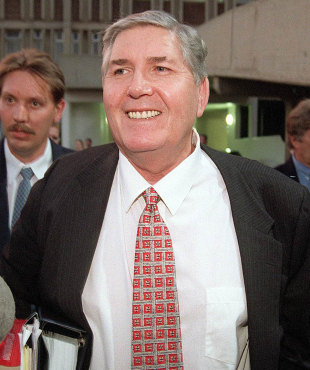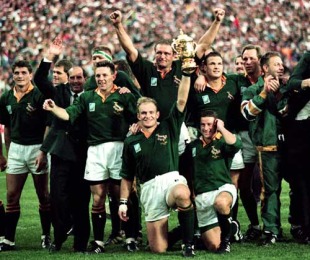|
South Africa Rugby
Luyt leaves a sizeable legacy
Stephen Nell
February 2, 2013

Louis Luyt was instrumental in bringing the 1995 Rugby World Cup to South Africa
© Getty Images
Enlarge
It is perhaps the South African Rugby Union's tribute to Louis Luyt as a "single-minded and determined individual" that best summed him up. While it led him to great success in business and rugby administration, it also ultimately led to his demise as he bit off more than he could chew in opposing the South African government's right to appoint a commission of inquiry into the running of the game in 1998. The resulting court drama forced former South African president Nelson Mandela onto the witness stand and rugby's empty victory gave rise to a vote of no confidence in Luyt's leadership from within its own ranks. Until prior to his death it was not uncommon to hear a hankering to the leadership style of Luyt when the latter day problems of his former provincial stronghold - the Golden Lions Rugby Union (previously the Transvaal Rugby Union) - was brought into sharp relief. The union had cash reserves in excess of R80-million when he left at the turn of the century. There has subsequently been a steady demise to the point of them having been relegated from Super Rugby to make way for Southern Kings. He also looked out for the interests of South Africa's smaller rugby unions, which he identified as important players in the overall system for the playing talent they provided. But it was Luyt's contribution to rugby on a far larger scale that will be his legacy. He organised South Africa's hosting of the memorable 1995 World Cup and was crucial in overseeing the game's transition into professionalism. Luyt negotiated expertly with Rupert Murdoch's News Corporation for Sanzar Rugby's first broadcast deal, which amounted to US$ 555-million. South Africa, which holds the key to making Sanzar rugby a viable financial concern, got a bigger slice of the money than Australia and New Zealand.
Luyt's business acumen was highlighted by him building his company Triomf (Afrikaans for Triumph) into South Africa's largest fertiliser company in the 1970s. He also ventured into the beer business, taking on the might of South African Breweries. Luyt also headed up the controversial Citizen newspaper in 1976 and consequently became enmeshed in South Africa's infamous Information Scandal. However, he mostly found himself deeply at odds with the South African government at the time. He was in many ways a visionary and was deeply involved in talks with the African National Congress (ANC) - now South Africa's governing party - about unity in rugby. That was achieved in 1992, which led to the Springboks' return from the rugby wilderness. But it started on a controversial note as South Africa's old national anthem was played before kick-off in the Springboks' first game back against the All Blacks in Johannesburg in 1992. True to form, Luyt was defiant in the political fall-out, which almost led to the calling off of the scheduled match against the Wallabies in Cape Town the following Saturday. Luyt's achievements in politics included facilitating talks for the establishment of South Africa's Democratic Party, which has subsequently evolved into the Democratic Alliance. It has now emerged as serious opposition to the ANC. After his rugby days, Luyt himself ventured into politics with his Federal Alliance party. Luyt's tale was one of rags to riches. He grew up in poverty and recalled in his autobiography, Walking Proud, of how he was admonished for knocking on the front door of wealthy home owners as he went to collect crackling with a soup plate in his hands. His humiliation and father's lack of business acumen would be a driving force.

Louis Luyt angered the All Blacks with the suggestion that the Springboks would have won the first two World Cup had they not been 'isolated'
© Getty Images
Enlarge
Luyt's achievement in business and rugby were substantial. In fact, he will probably be mentioned in the same breath as the late Danie Craven for his contribution to South African rugby. Unfortunately the universal dislike for Luyt's public persona will probably mean that he is never viewed in an objective light. He infamously infuriated the New Zealand team after the 1995 World Cup final by intimating that South Africa would have won the tournaments in 1987 and 1991 had they participated. In truth, those who knew Luyt well enjoyed his delightful sense of humour. He was not the man many believed him to be and could play the piano and banjo. He was also a deep lover of classical music. Luyt played the games of rugby, business and politics hard. Inevitably he made mistakes, but his legacy is immense. © ESPN Sports Media Ltd.
| |||||||||||||||
Live Sports
Communication error please reload the page.
-
Football
-
Cricket
-
Rugby
-
- Days
- Hrs
- Mins
- Secs
F1 - Abu Dhabi GP
Abu Dhabi Grand Prix December 11-131. Max Verstappen ()
2. Valtteri Bottas (Mercedes)
3. Lewis Hamilton (Mercedes)
4. Alexander Albon ()
5. Lando Norris ()
6. Carlos Sainz Jr ()
-
ESPNOtherLive >>
Darts - Premier League
Golf - Houston Open
Snooker - China Open
Tennis - Miami Open

